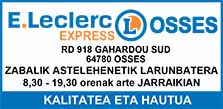Allison Williams. I’m only a few sips into my picon punch, a bright and bitter (and very boozy) cocktail, when I hear my companion place her order: “Can I have a Franco Is Still Dead?” It takes me a moment to decipher the cocktail name, but then I laugh. It’s a joke about Spain’s twentieth-century erstwhile authoritarian dictator—and the joke only lands because we’re in Boise, Idaho.
Lael Uberuaga-Rodgers, she of the cocktail order, is a quarter Basque. We’re in a Basque bar called Leku Ona—or “good place” in the Basque language—located on one corner of downtown Boise’s Basque Block. To hang out here, it helps to know something about the Basques, if just to catch the jokes on the menu.
For six days beginning on July 29, this will be the busiest block in Idaho. Jaialdi (pronounced “high-aldi”), the city’s Basque festival, returns every five years, but the 2020 edition was canceled due to Covid; it’s been a decade since the last one. Jaialdi is one of the largest Basque festivals in the world, held in a place that’s home to one of the globe’s biggest concentrations of the Basque diaspora.
Festivalgoers will wander dozens of food booths that line the Basque Block selling chorizo and croquettes and bite-size pintxos. Musicians will play accordion and tambourine on street corners, in front of the red brick of one of the original Basque boardinghouses and the whitewashed walls of the Basque Center, a community hall built in a traditional farmhouse style. In a nearby arena, Basque Country athletes will demo traditional sports like weightlifting and wood chopping.
Basque Country is made up of four Spanish and three French historical provinces, forming a roughly 125-mile-wide plot between the Bay of Biscay and the Pyrenees Mountains—in Europe, nowhere near the capital of Idaho. Long a distinct culture from their neighbors, and speaking a language related to neither French nor Spanish, the Basques produced everything from Christopher Columbus’s shipbuilders to the first Jesuit priest. In the late nineteenth century, migration escalated to the American West, where sheepherders were recruited by landowners.
“Basques were good because they were typically honest and hardworking,” says Dan Ansotegui, a Basque chef whose four grandparents were all born in the old country. Since they spent more than half their time in the hills with the sheep, the immigrants’ in-town lodgings were part-time. Boardinghouses run by Basque women served as permanent addresses, storage sites, and community links.
As they recruited brothers, sisters, cousins, and neighbors, their numbers climbed; Basque populations thrived in Boise; Elko, Nevada; and Bakersfield, California, while Gen. Francisco Franco took power in Spain and outlawed Basque culture and language. (Hence the cocktail celebrating Franco’s demise.)
And in Jaialdi, everyone joins in. The event (it just means “festival” in Basque) launched in 1987, and this summer’s edition is expected to be its biggest ever. Uberuaga-Rodgers, part of the volunteer staff, estimates it takes hundreds of locals to put it on. “We are really proud of our culture,” she says. “A lot of us have grandparents and great-grandparents that immigrated here from Spain at a time when celebrating Basque culture was illegal.” The multigenerational aspect of the culture means that traditional dances, like the ones that pop up on the Basque Block during Jaialdi, tend to involve “fancy ways you can do the steps, [and] easy grandma-and-grandpa ways you can do the steps.”
A lot has happened since the last big event, including a population boom in the greater Boise area, and Uberuaga-Rodgers says they expect 30,000 or 40,000 people. But given that Jaialdi happens less often than the Summer Olympics, it’s not the only Basque celebration in town: Every summer, the San Inazio Festival is like a mini Jaialdi, with just three days of food, music, and general celebration.
A few streets away from the Basque Block, in a small restaurant somewhat hidden from the street, Dan Ansotegui rolls meatballs between his hands. The meat is the color of a brick, and he explains that he’s doing what his grandmother would have never done—flavoring it with a sauce made from peppers that hang in a bundle from one corner, treating it as if it were chorizo. Some 400 years ago the choricero was a chile pepper in the Americas, Ansotegui says, but once brought to Spain it was bred into a milder flavor thanks to both climate and the spice-averse population. Now it gives his lamb and pork meatballs their red color.
Ansotegui, whom I hear someone call a “serial restaurateur,” has launched half the town’s Basque eateries. At this newest endeavor, Ansots Chorizo, he, wife Tamara, and daughter Ellie produce meats to be sold to local restaurants and serve lunch a few days a week. Since opening Ansots in 2020 he has earned three James Beard Award nominations.
The Ansots chorizo varieties run from his grandmother’s traditional recipe to a smoky txistorrak from Navarro and a roasted garlic version from the Rioja region of Spain; the company operates a production facility that makes and cures the sausages. This is nothing like a Mexican chorizo, but rather short links with a stiff casing easily cut with a butter knife. As Ansotegui promises, the kick is no more than a modest 4 out of 10 on the spice scale.
Chorizo plays a central role at all the town’s Basque restaurants, and meals often start with fried croquetas filled with ham or salt cod. As I taste the meats, Ansotegui brings me gilda pintxos, small bites packed with olive and pimento flavors. Other Basque specialties served across town can include lamb burgers or paella; the new Basquanese, inside a Boise food hall, serves both Basque classics and Vietnamese fare.
When Jaialdi takes over downtown Boise, Ansotegui will be focusing on feeding as many people as possible, but also playing button accordion in his music group. He learned the traditional instrument in Basque Country during one of his many trips to his grandparents’ homeland.
In the Basque Museum a few blocks away, there’s a photo of him as a child, dressed in the traditional white with a red sash and hat, dancing as an accordion player smiles down at him. Decades later, with James Beard recognition on the walls, he spends his days fueling Boise’s Basque culture. Yesterday, he tells me, he went to see a children’s dance event and then had dinner at Leku Ona, one of the city’s few Basque restaurants he didn’t start himself. As important as Jaialdi will be this summer, it’s not particularly rare to feel the Basque energy in downtown Boise.
Back at Leku Ona, Uberuaga-Rodgers drinks her Franco Is Still Dead (a smooth, boozy whiskey cocktail) while I sip my picon punch, the latter a traditional Basque tipple so alcoholic that the bartender warns me to stop at one. Jaialdi is coming, but you can visit Basque country here any time. Uberuaga-Rodgers sums up the culture in a few words: “Great food. Love to party.”



 Lagun bati bidali
Lagun bati bidali Komentarioa gehitu
Komentarioa gehitu








